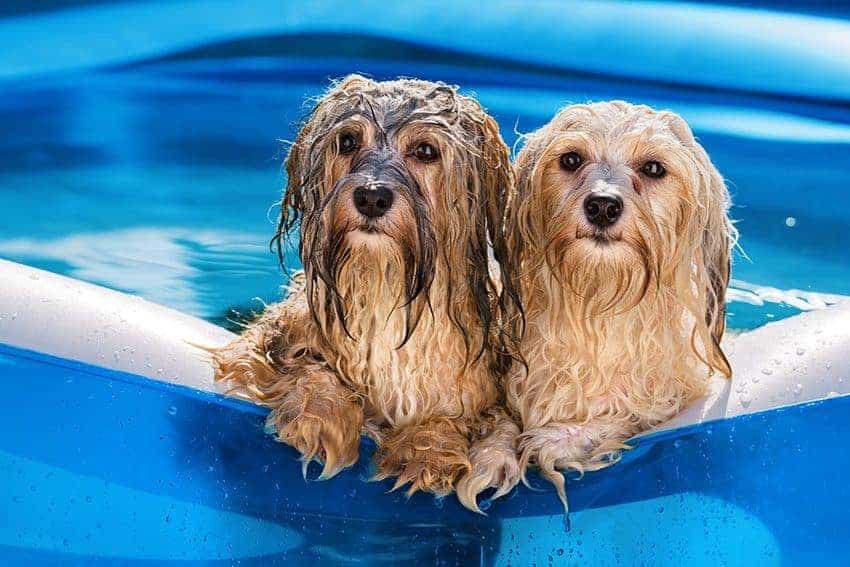
Hot weather can be quite uncomfortable for our pets in their fur coats and they will appreciate some extra care and attention to stop them from getting overheated. Our top 10 tips will help…
1. REVIEW YOUR ROUTINE
In the height of summer, your dog won’t appreciate walkies during the hottest part of the day – particularly as pavements can be sizzling enough to burn paws. Take them out in the early morning and late evening and let them snooze through the sultry afternoons. Breeds of dog with flattened faces, such as Pugs and Boxers, should never be exercised in the heat of the day.
2. REPOSITION ACCOMMODATION
Look at where the sun’s rays are positioned throughout the day and reposition outdoor hutches accordingly so that they are shaded and not exposed to the sun’s direct rays. The same applies for the homes of indoor pets – move them well away from windows and draw the curtains.
3. GET GROOMING
Brush long-haired cats, dogs, rabbits and guinea pigs daily as matted fur traps heat. If it looks like a prolonged heatwave has set in, you may even want to consider giving them a summer trim.
4. SPLASHDOWN
Many dogs and ferrets will enjoy a splash in a children’s paddling pool, which will help them to keep their cool. For hot cats, rabbits and guinea pigs, try gently stroking their fur with a cool, damp flannel – with bunnies, carefully damp their ears too, as this is the part of their body that they lose heat from. As the water evaporates, it will provide a cooling effect.
5. COLD COMFORT
Pet cooling pads, which automatically cool when your dog or cat sits on them, are now available from many high-street outlets. For small pets such as guinea pigs, rabbits and ferrets, a ceramic tile, kept overnight in the fridge, will provide a lovely, long-lasting cool surface for them to lie on. Another trick is to try placing hard plastic freezer pads, wrapped in a towel, in your pet’s hutch. Litre plastic bottles, three-quarters filled with water and popped in the freezer, can be placed under a towel so that your rabbit or ferret can lean against them. Keep a close eye so that no chewing ensues. You can also try draping well-rung out cold wet towels over hutches or cages to cool them down. Be wary of plastic guinea-pig igloos as these can become very hot in the summer and are best replaced by an alternative hidey-hole such as a cardboard box with an entrance and ventilation holes cut into it.
6. FAN-TASTIC
Using an electric fan in the room where indoor pets live can help keep the air circulating. Just make sure the fan is not near enough for any wires to be reachable and never direct it straight at your pet’s cage.
7. WATER WORKS
Pets need to stay hydrated and should have constant access to clean, cool water – so keep water bowls and bottles topped up. One way to encourage pets to drink more – particularly cats who often turn their feline noses up at a still bowl of water – is a pet water fountain. Ferrets are likely to enjoy this too.
8. COOL TREATS
Add ice-cubes to water bowls and pop a Kong lined with a thin smearing of meat or fish paste in the freezer to create a tasty cooling snack for your dog to lick. A fun way to help keep your dog or cat hydrated is to offer them ice-cubes made from frozen chicken stock to lick and chew.
9. PET SHELTER
Providing shelter from the sun is vital – if your garden doesn’t have much natural shade then it could be worth investing in a large, free-standing parasol or a ‘pop up’ sun shelter, like those used at the beach. Encourage your pets to seek out these shaded areas by placing a familiar blanket down for them.
10. SUN PROTECTION
A little sunshine does wonders for health and wellbeing, but too much can have the opposite effect. Just like people, pets need protection from the damaging effects of intense sunshine, particularly if they have white fur. Use special pet-friendly sunscreen (available from good pet retail outlets) to protect their noses, ear tips and towards the inside of ears where hair is sparse, and any white or hairless parts of their bodies. Don’t use sunscreen intended for humans as the perfumes and chemical agents it contains may irritate animal skin as well as your pet’s tongue, throat and stomach if they try to lick it off.
HEATSTROKE ALERT – BE AWARE OF THE SIGNS
Heatstroke can be fatal, so it’s vital to take swift action. It can develop when an animal is too hot and is unable to reduce their body temperature. If your pet exhibits symptoms such as faster panting, excessive drooling, darkened gums, agitation, staggering, vomiting or diarrhoea, seek advice from a vet immediately. Old, young and overweight pets, and those with thick heavy coats are more at risk. Dogs with very short flat faces, such as pugs and bulldog types, and those with certain diseases or on some types of medication, are also more at risk.
Emergency First Aid for dogs
As recommended by the RSPCA
For the best chance of survival, dogs suffering from heatstroke urgently need to have their body temperature lowered gradually.
Move him/her to a shaded/cool area.
Immediately douse the dog with cool (not cold) water, to avoid shock. If possible, you can also use wet towels or place him/her in the breeze of a fan.
Allow the dog to drink small amounts of cool water.
Continue to douse the dog with cool water until his/her breathing starts to settle but never so much that he/she begins to shiver.
Once the dog is cool, take him/her to the nearest vet as soon as possible, ideally while someone else continues to cool the dog down.
Sources: rspca.org.uk, onlineguineapigcare.com, guineapigsaustralia.com.au, thespruce.com, petcha.com














